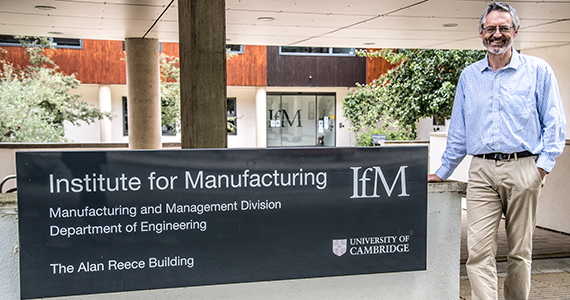IfM receives prestigious Royal Academy of Engineering award for COVID-19 work

The Institute for Manufacturing (IfM) has been recognised by the Royal Academy of Engineering as one of 19 winners in the President’s Special Awards for Pandemic Service. These have been awarded across the whole field of engineering to exceptional projects that have helped address the greatest public health challenge of our age.
The IfM was recognised for its work helping local hospitals to make the best use of their resources, streamlining logistics for sourcing and storing vital PPE, informing decision-making on emergency demand, and developing a ventilator sharing system to be used in emergencies.
About the project
As hospitals scrambled to make the necessary operational changes needed to accommodate COVID-19 patients, a team of staff and students from the IfM was there to help. Working with clinicians and senior healthcare managers to assess the immediate and emerging operational challenges facing local hospitals, they identified where these could be addressed through the application of engineering capabilities and coordinated the roll-out of solutions.
Engineering contribution
The IfM team addressed three groups of tasks between March and May in the areas of hospital logistics, personal protective equipment (PPE) delivery and intensive care unit (ICU) equipment development.
In the hospital logistics area, the team applied industrial engineering approaches to COVID-related challenges including modelling in-hospital patient flows, redesigning COVID-19 testing procedures and managing oxygen supplies to the wards.
Understanding oxygen flow through the local hospital involved examining pipes and their layout, then analysing usage by ventilator type and patient need, as well as modelling supply and demand. The in-depth work of the IfM team enabled the hospital’s clinical and estates teams to identify and address various bottlenecks and improve operational efficiency.
The team also looked at the design, setup and management of a temporary logistics hub for coordinating the delivery of millions of items of donated PPE and assessed the production capabilities of local manufacturers to increase flexibility of PPE supplies for local hospitals.
In conjunction with anaesthetists at Royal Papworth Hospital, they also devised an active ventilator sharing system in case there were not enough ventilators available during the COVID-19 outbreak. This involved the accelerated design, prototyping and in-hospital testing of an active ventilator sharing system in just four weeks.

Duncan McFarlane, Professor of Industrial Information Engineering at the IfM, led the team as they engaged with senior clinical and management teams within local hospitals to understand their needs and implement effective and collaborative ways of working. This involved joining the hospital's regular operations planning meetings and running daily project reviews with key hospital personnel during the peak COVID-19 surge, as well as working directly with clinicians in areas such as COVID-19 test processes, ward oxygen supply, and equipment design.
Impact
The IfM team helped local hospitals make the best use of their resources and streamlined logistics for sourcing and storing vital PPE and other issues, enabling healthcare providers who were already feeling the strain to address pressing operational challenges.
In addition, the IfM provided analytical approaches for informing decision making at Cambridge University Hospital (CUH) on emergency demand. The Trust is also using the team’s findings to forecast changes to demand for beds, equipment and staff when social distancing measures are relaxed or modified further. The hospital said the engineers brought diversity of perspective and a joint CUH–IfM panel has been initiated so that the hospitals and the IfM can continue working together for mutual benefit after the pandemic.
Roland Sinker, CEO of Cambridge University Hospitals, says: "The IfM staff and students consistently demonstrated commitment to use their engineering expertise and time to serve our patients and protect our staff in these challenging times."
Professor Richard Prager FREng, Head of the Department of Engineering at the University of Cambridge, says: “The team gave key support efficiently and skilfully when it was most needed, with no fuss and maximum impact. Engineering at its best.
“The team found a way to work with the clinicians without taking up too much clinical time. They found the problems that needed solving and got on with solving them. They stepped up when they were needed and made a real difference. For this, we should be proud of them.”
Professor Tim Minshall, Dr John C Taylor Professor of Innovation and Head of the Institute for Manufacturing, says: “It makes me so proud to see the way in which our students and staff – academic, research and administrative – were able to rapidly understand and help address the operational challenges facing the amazing teams at Addenbrooke’s and Royal Papworth during this crisis.
“We are also delighted that there is such enthusiasm from both CUH and the IfM to build upon this experience and to develop ongoing collaboration in applying industrial engineering capabilities to healthcare system needs.”
Date published
17 August 2020










